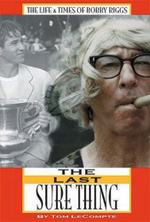Bobby After the War:
Part 1
Tom LeCompte

Amid the rubble and devastation of World War II, history was left to ponder what might have been on many fronts, including tennis. Although minor compared with the epochal issues in the world, the tennis questions still remained. Would Bobby Riggs have won back-to-back Wimbledons? Or 4 or 5 Wimbledons? And how many U.S. Nationals?
In the United States during the war, tennis limped along from 1942 to 1946, encouraged by President Franklin D. Roosevelt as a morale booster for the home front and the troops overseas. But the top players were all in uniform. (Click Here.)
Some tournaments were cancelled for the duration. Others were played with reduced draws and shortened schedules, or were limited to women.
Newport, the nation's oldest tournament, was suspended until war's end. At Forest Hills, the men's matches were cut from best-of-five sets to best-of three until the semifinals.
The end of hostilities left the tennis world to pick up the pieces. Only after some debate did the All England Club decide to stage Wimbledon in 1946, despite a shortage of racquets, balls, and court equipment, and with a large section of the still damaged Centre Court cordoned off.
Wartime passions led the International Tennis Federation, the organization that oversaw Davis Cup competition, to temporarily expel nine countries, including Germany, Italy, and Japan. The Cup itself remained locked in a bank vault in Australia.
The Return to LA
For Bobby Riggs, his first order of business was to make up for lost time. Moving to Los Angeles, Bobby returned to the Los Angeles Tennis Club, which had changed little since he was last there.

Joining him was a familiar crowd: Bill Tilden, Don Budge, Gene Mako, Frank Parker, Frank Shields, and Fred Perry. Still awaiting his formal discharge, Bobby was able to work on his game and rustle up money matches. He also began to mingle with the Hollywood set: Errol Flynn, Douglas Fairbanks Jr., Humphrey Bogart, Claudette Colbert, Gary Cooper and Charlie Chaplin.
In addition Bobby found himself thrown into matches with some of the up-and-coming juniors at the club, which then included a temperamental kid from East L.A. named Pancho Gonzales.
Without a professional tour, Bobby, Don Budge and the other players cast about for something to do when Tilden suggested staging a big professional tournament at the L.A. Tennis Club. Billed as the World Hard Court Professional Championships, the event was the first week of December in 1945, four weeks after Bobby's official discharge from the Navy.

Tilden
Tilden acted as tournament director, promoter, and participant. Though 52 years old and way past his glory years, Tilden was still a monumental figure in the game, admired by players and beloved by fans. Not only that, but his 52-year-old game was amazing.
Before enthusiastic crowds, Tilden amazed everybody by reaching the semifinals, dispatching big-hitting Lester Stoefen 7-5, 6-0 in the quarterfinals, a feat made more remarkable by the fact that the old man had been down 5-2 in the first set--and then run off 11 straight games.
The next day, Tilden returned to earth, getting trounced by Budge, but in a third place playoff, he again surprised the gallery by defeating Fred Perry in a tough three-set match. Like the Tilden of old, he hit aces all over the court, and seized every opportunity to send his forehand drives deep into the corners for winners.
The final pitted Budge against Bobby, the two players most fans expected. With the public largely ignorant of Budge's shoulder injury and Bobby's victories over Budge in their Army-Navy series, Budge remained the overwhelming favorite.

Few knew that the Budge who walked out on the court that day was not the awe inspiring Budge who had dominated Bobby in both the amateur and professional ranks. But when Budge went up a set and 3-1 in the best-of-five-set encounter, it looked like he would maintain his dominance regardless.
Then Bobby roared back. He kept the ball away from Budge's backhand, attacked Budge's second serve, and lobbed at every opportunity to take advantage of Budge's lingering shoulder injury. Bobby took five straight games to win the second set and then went up 5-2 in the third set.
Budge started grasping his right arm. He called time and had a doctor summoned to the court. Budge complained of cramping in his arm, and the doctor gave him a quick rubdown before letting him continue. After Bobby served out the third set, 6-2, the players were given an intermission, during which Budge retired to the locker room, where he received a complete rubdown, took a shower, and changed his clothes.

It was of no use. Bobby ran through the fourth set, 6-0, to win the match. Eventually, after collecting from the losing bettors in the crowd, a jubilant Bobby spoke to the press. "I'm sorry that it happened that way," he said, alluding to Budge's arm troubles, "but I'd have beaten him anyway.
"I'm champion today. I've always wanted to be the champ and I've worked and struggled all along towards that end. I caught up with Budge today. Shake hands with the new champion, boys."
But few were ready for a new champion to be crowned. Most fans refused to believe Bobby could defeat Budge on even terms.
The Rematch, the Lob, and the Clock
The newspapers speculated Budge's ailing arm was behind the, defeat, and Budge himself suggested as much. To settle the issue, a rematch was scheduled for the next month, January 1946, at the Pan-Pacific Auditorium in Los Angeles.

Sixty-five hundred people packed into the hall, the biggest turnout yet to see a match on the West Coast. Thousands were turned away at the door.
"No one could believe that a little runt like me had a chance against the great Don Budge," Bobby said. "The time before had been a fluke, the master had been wounded and out of condition. There wasn't a tennis expert in the country who would make it even money. Which was fine with me, since I got terrific odds.
"That night in the dressing room before the match, Errol Flynn came in with some friends and they bet me twenty-five hundred dollars each at odds of two-to-one that I would lose. It was terrible. Even my supporters were worried. I got all the pre-game bets I could handle."
Inside the Pan-Pacific Auditorium a large clock hung from the ceiling some 35 feet above the center of the court. From the opening game, Bobby started lobbing. He figured that to get just the right depth, the ball had to be lofted about three inches beneath the bottom of the clock.
Too low, and the ball would fall short, only to be put away by one of Budge's overhead smashes. Too high, and the ball would hit the clock, and Bobby would lose the point.

Budge played with the heaviest racquet in the game, seventeen and a half ounces, a fact he was openly proud of as that only added to his reputation as a power hitter.
"Budge was a straightaway smasher," Bobby said. "He killed the ball. When he was fresh they were almost impossible to return. But how fresh will a man remain when he has to rely on his overhead for ninety percent of his game? Just about a set, I figured."
Budge played impressively that night. He took the first set, 6-4, and jumped to a 5-2 lead in the second set, winning with his big serve and attacking volley. His fans were screaming wildly and waving pennants in the air. While toweling off at a changeover, Bobby looked up and saw Errol Flynn sitting in a sideline box a few feet away, smiling broadly and making dollar signs at him.
The odds had skyrocketed by then, but Bobby continued to make bets using hand signals. Recalled one fan sitting behind Clark Gable and Groucho Marx: "Whenever Riggs changed sides in the match, he placed bets on himself by holding up fingers to the crowd.


Gable held up one finger. Riggs shook his head and held up two fingers. Gable held up two fingers and nodded. That meant that Riggs bet Gable $2,000 that he would win that set, even though he was behind, 5-2. He also placed bets with Groucho and others the same way."
On the other side of the court, his brother John Riggs was doing the same. Together, Bobby and John were able to get odds as high as 10-to-1 against Bobby's winning.
.Cool and composed, Bobby stuck to his game plan. "Every time I lobbed I could hear the crowd holding its breath to see where the ball would go," Bobby said. "Most of them fell within six inches of the baseline. Only three of them actually hit the clock. I must have lobbed him about seventy times during that match." In the second set, Bobby saved two set points, pulled even, and took the set, 9-7.

"It was obvious to me," Bobby said, "that Budge was getting tired. That racquet of his was beginning to feel as though it weighed twenty pounds. But I figured that much out before the match."
"By the middle of the third set," Bobby said, "Budge was getting sick of those lobs. He was deathly ill. In the third game of that set I gave him seven straight lobs in one point, all of which missed that clock by a hair. He smashed them all back, except the last one,and after that it was all downhill. I took the last two sets,6-4, 8-6, and Budge retired to the dressing room with a steel elbow."
In his own mind, Bobby felt vindicated. He had completed his mastery over Budge. Never again would he feel intimidated by the Great One. Others took notice, too. The great Tilden, who scoffed after Bobby's victory at Wimbledon in 1939, wrote: "Once more Riggs proved himself the champion of the world. Once more Budge, greatly to my regret, showed he is no more the player he was.
"What has gone? I can only explain it by saying that Budge now plays not to lose. He is no longer playing to win." The supreme confidence that had served Budge so well had wilted.
The Great One, who for so long seemed so far above everybody else, had returned to earth. Joining the company of mere mortals, he was now vulnerable.





